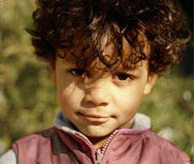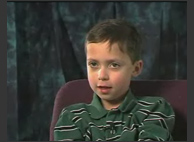| CDC: Learn the Signs, Act Early | |
| CDC: Prevalence of Autism | |
| Adam, Age 8 | |
| Ryan, Age 23 | |
| NINDS: Autism Fact Sheet | |
| CDC: Growth Chart & Development Milestones | |

Communication
One of the three primary areas of dysfunction in autism are problems with language and communication:
By age 3, most children have passed predictable milestones on the path to learning language; one of the earliest is babbling. By the first birthday, a typical toddler says words, turns when he hears his name, points when he wants a toy, and when offered something distasteful, makes it clear that the answer is "no." Some children diagnosed with ASD remain mute throughout their lives. Some infants who later show signs of ASD coo and babble during the first few months of life, but they soon stop. Others may be delayed, developing language as late as age 5 to 9. Some children may learn to use communication systems such as pictures or sign language.
(For additional clips see the ASD Video Glossary.)
Those who do speak often use language in unusual ways. They seem unable to combine words into meaningful sentences. Some speak only single words, while others repeat the same phrase over and over. Some ASD children parrot what they hear, a condition called echolalia. Although many children with no ASD go through a stage where they repeat what they hear, it normally passes by the time they are 3.
Some children only mildly affected may exhibit slight delays in language, or even seem to have precocious language and unusually large vocabularies, but have great difficulty in sustaining a conversation. The "give and take" of normal conversation is hard for them, although they often carry on a monologue on a favorite subject, giving no one else an opportunity to comment. Another difficulty is often the inability to understand body language, tone of voice, or "phrases of speech." They might interpret a sarcastic expression such as "Oh, that's just great" as meaning it really IS great.
While it can be hard to understand what ASD children are saying, their body language is also difficult to understand. Facial expressions, movements, and gestures rarely match what they are saying. Also, their tone of voice fails to reflect their feelings. A high-pitched, sing-song, or flat, robot-like voice is common. Some children with relatively good language skills speak like little adults, failing to pick up on the "kid-speak" that is common in their peers. Without meaningful gestures or the language to ask for things, people with ASD are at a loss to let others know what they need. As a result, they may simply scream or grab what they want. Until they are taught better ways to express their needs, ASD children do whatever they can to get through to others. As people with ASD grow up, they can become increasingly aware of their difficulties in understanding others and in being understood. As a result they may become anxious or depressed.
NIMH



